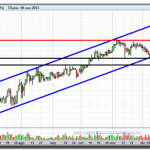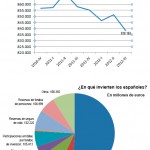¿Qué podemos esperar del mercado esta semana? 140 para tratar las cuatro áreas clave para tus finanzas y la economía global más un «Y si…»
Macro
German exports – Germany is tired of everyone complaining about its trade surplus. The irony is that when data on Thursday showed the surplus having almost halved in August thanks to a 6 per cent fall in exports investors started wailing like school children. Some perspective is needed. These are volatile numbers at the best of times and holidays in several states were moved forward into August. But even taken as read the decline only takes exports back to where they were in mid-March and the medium-term positive trend remains intact. Indeed the nominal value of German exports is now a full tenth above pre-crisis peaks. By contrast exports from the UK have been trending down for three years and are barely above January 2011 levels. With another 5 per cent fall in the euro since August it is too soon to panic.
Strategy
Oil – A riveting side story to the slump in oil prices this year is that Brent is down 50 per cent more than WTI. The spread between them is now just below five dollars versus $20 two years ago. In a way that makes sense given America»s economic prospects are superior to Europe»s and countries such as Libya have doubled production in the past two months. The expectation the US lifts its ban on crude exports also helps. But hang on – shouldn»t America»s shale revolution be weighing on WTI? It certainly did two years ago but with new pipes and railways transporting oil to coastal refineries home-grown supply is simply replacing imports. For example African oil exports to America are down 90 per cent since 2011. Conversely, for refiners in Europe the narrowing spread is a nothing short of a life-line.
Stocks
Spin-offs – Citigroup and OneMain, Ebay and PayPal, BHP and Billiton, H and P. Suddenly spin-offs have replaced inversions as the corporate action de jour. But for efficient market nerds spin-offs are puzzling. Theoretically spun-off companies should not significantly outperform their peers on average – but they do. Surely everything good or bad about spin-offs is understood while they reside within the parent. Or if new information becomes available during the spin-off process this should be reflected in the IPO price. But somehow hidden value is magically unleashed when these companies are set free. Indeed within three years the operating margin of a spin-off has improved by a third on average, according to one study. Conversely, most academic research shows no statistically significant boost mobile casino to shareholder returns or profitability on average for the parent company. Being the one left behind is always sadder.
Finance
Funky capital – More grumblings this week from the ECB over legal moves across peripheral Europe to ensure deferred tax assets remain included towards tier one equity – a practice the European Union had supposedly regulated out of existence by 2018. There is no question this capital is illusory should another crisis occur, and that taxpayers would be left on the hook. The problem is that for peripheral countries the numbers are frightening minus deferred tax assets. For Spanish banks, for example, €30bn of deferred tax assets account for a fifth of the aggregate 10 per cent Basel 3 core tier one ratio. If they were excluded from capital, Spanish banks would either have to raise a similar amount elsewhere or cut €300bn of risk weighted assets from their balance sheets. That is not something even the ECB could imagine, however justified its frustration.
Digestif
Pound and property – For the first time since January 2011 this week more surveyors said London house prices had fallen than risen over the past three months. Given foreigners account for half the property transactions in prime London expect gloomy dinner parties from Singapore and Moscow to Sao Paulo and Mumbai. But how does this affect Britain? Data from Savills – an estate agent – show that in 2012 overseas buyers poured in £7bn of equity into prime London housing. That alone helped finance 12 per cent of the UK»s current account deficit and partly explains the strength in sterling despite a yawning trade deficit. So if London property is a big UK export, falling house prices could be a terms of trade shock with implications for the pound. At least overseas dinner parties could then drown their sorrows in cheaper imports of Single Malt.













